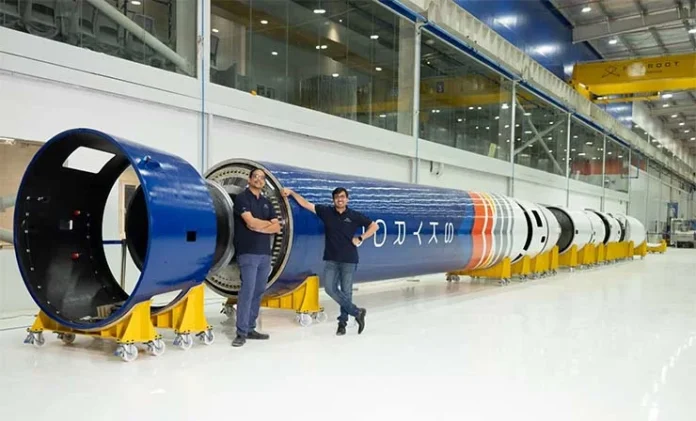Chennai: In a first, Skyroot Aerospace unveiled India’s first privately designed and developed orbital-class rocket named ‘Vikram-1‘. Expected to perform its maiden flight to space in the first quarter of 2024, the unveiling is a milestone for the country. India’s space sector has seen significant growth over the last three years, following the roll-out of Space-sector reforms by the Indian Government which enabled private firms to design, develop, build and launch their own rockets, satellites and offer allied services.
Dominated by the Indian Government-run ISRO, the Indian Space sector is witnessing now the mushrooming of startups and is expected to improve the spread and size of the Indian space economy.
Skyroot’s Co-Founder Pawan K Chandana, unveiling the Vikram-1 rocket at Skyroot’s new facility in Hyderabad, Telangana, said that their firm now employs 300 personnel and has bagged more than Rs 500 crore ($ 62.5 million approx) in investment. With Skyroot’s maiden rocket launch of the vehicle Vikram-S in November, 2022, India became the fourth nation where private firms have built and launched rockets. Ours is the largest private rocket development centre in South Asia, he said.
He added, “We’ve named our new facility ‘MaxQ’, it is a technical term denoting the maximum stress and loads that a rocket experiences during its ascent. A rocket has to undergo and push through all this, before it reaches space. Likewise, we would like our team to push ourselves to do extraordinary things in the space sector.” Skyroot also showcased an animated preview of their maiden orbital launch, that is expected in the first quarter of 2024.
The firm recently signed pacts with French satellite firms, indicating that they are gradually working towards on-boarding customer satellites for commercial launches. Gaining customers is crucial for a rocket company to stay afloat as Skyroot has a direct competitor in ISRO’s newest rocket SSLV, that also ferries similar payloads to orbit. SSLV has already flown twice and delivered one successful mission.
According to Skyroot, the Vikram-1 vehicle would be able to deliver payloads weighing between 290-480 kg, to different orbits that are 500 kms above the earth. Being a solid-fuelled rocket and using relatively simpler technologies would mean that launching this vehicle would require minimal infrastructure and that the rocket can be assembled and launched within 24 hours from any site. The firm is also developing more versions in the Vikram series and those would involve the use of Cryogenic engines that are more efficient and sophisticated.
“The increased role of the private sector in the space domain would lead to a healthy synergy between the Government-run ISRO and the startups, thereby leading to knowledge sharing. He also mentioned that it would eventually result in more rocket launches being carried out from India and more revenue being generated by it,” said Dr Jitendra Singh, Minister of State, Prime Minister’s Office, speaking on the occasion.
“The scale of wok is increasing, we can’t meet our future requirements in isolation. The opening-up of the space sector for private firms is a win-win situation” he added. He also said that there were some foreign-origin estimated pegging the Indian space economy at $ 100 billion by 2040. At present, the Indian space economy is said to be around 2 percent of the $ 450 billion global space economy. In order to create greater synergy between the space agencies of G20 nations, India’s Government-run Department of Space also held a Space Economy Leaders Meeting, under the umbrella of the G20 Summit that India hosted this year.





